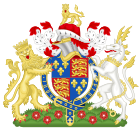| Act of Parliament | |
 | |
| Citation | 2 Hen. 5. Stat. 1. c. 7 |
|---|---|
| Other legislation | |
| Repealed by | |
Status: Repealed | |
The Suppression of Heresy Act 1414 (2 Hen. 5. Stat. 1. c. 7) was an Act of the Parliament of England. The Act made heresy an offence against the common law and temporal officers were to swear to help the spiritual officers in the suppression of heresy. Justices of the peace were given the power of inquiry; to issue an order to arrest; and to hand over the suspected heretic to the ecclesiastical court for trial.[1]
After arrest and allocation to a diocese, the initial vetting as to whether the person has heresies, errours, or Lolardies was up to the local bishops (the "ordinaries"): the secular authorities were not to make spiritual judgements: if the bishop found no serious or persistent heresy, the accused was in theory then protected from the secular authorities. The discovery of Lollard literature by sheriffs was not to be taken as direct evidence of heresy etc, but just as information: the indited person is innocent until proven guilty and the bishops must establish the truth themselved and not rely on the claims of the inditement presented to them:
...þe sayd indightmentes be not taken in evidence but onely for information before the Judges spirituall, agaynst such persons indighted: but that the Ordinaries begin their proces agaynst such persons indited, in the same maner, as though no such iudgement were, hauyng no regarde to such inditementes.
— an. 2. Henrici. 5. cap. 7[2]
If found to be heretics, they should be handed back to the secular authority and have a jury trial of men of independent means.[3]
- ^ Medley, Dudley Julius (1925). A Student's Manual of English Constitutional History (6th ed.). Oxford: Basil Blackwell. pp. 601–602.
- ^ https://www.dhi.ac.uk/foxe/index.php?realm=text&gototype=&edition=1576&pageid=572#top
- ^ https://www.dhi.ac.uk/foxe/index.php?realm=text&gototype=&edition=1576&pageid=572#top